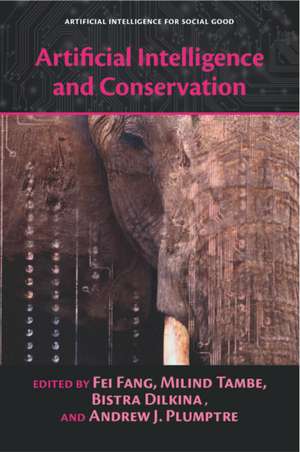Artificial Intelligence and Conservation: Artificial Intelligence for Social Good
Editat de Fei Fang, Milind Tambe, Bistra Dilkina, Andrew J Plumptreen Limba Engleză Hardback – 27 mar 2019
Toate formatele și edițiile
| Toate formatele și edițiile | Preț | Express |
|---|---|---|
| Paperback (1) | 329.16 lei 6-8 săpt. | |
| Cambridge University Press – 27 mar 2019 | 329.16 lei 6-8 săpt. | |
| Hardback (1) | 805.60 lei 6-8 săpt. | |
| Cambridge University Press – 27 mar 2019 | 805.60 lei 6-8 săpt. |
Preț: 805.60 lei
Preț vechi: 1007.00 lei
-20% Nou
Puncte Express: 1208
Preț estimativ în valută:
154.15€ • 160.94$ • 127.58£
154.15€ • 160.94$ • 127.58£
Carte tipărită la comandă
Livrare economică 04-18 aprilie
Preluare comenzi: 021 569.72.76
Specificații
ISBN-13: 9781316512920
ISBN-10: 1316512924
Pagini: 246
Ilustrații: 53 b/w illus.
Dimensiuni: 157 x 235 x 18 mm
Greutate: 0.45 kg
Editura: Cambridge University Press
Colecția Cambridge University Press
Seria Artificial Intelligence for Social Good
Locul publicării:New York, United States
ISBN-10: 1316512924
Pagini: 246
Ilustrații: 53 b/w illus.
Dimensiuni: 157 x 235 x 18 mm
Greutate: 0.45 kg
Editura: Cambridge University Press
Colecția Cambridge University Press
Seria Artificial Intelligence for Social Good
Locul publicării:New York, United States
Cuprins
Part I: 1. Introduction Fei Fang, Milind Tambe, Bistra Dilkina and Andrew J. Plumptre; Part II: 2. Law enforcement for wildlife conservation Andrew J. Plumptre; 3. Wildlife poaching forecasting based on ranger-collected data and evaluation through field tests Shahrzad Gholami, Benjamin Ford, Debarun Kar, Fei Fang, Andrew J. Plumptre, Milind Tambe, Margaret Driciru, Fred Wanyama, Aggrey Rwetsiba, Mustafa Nsubuga and Joshua Mabonga; 4. Optimal patrol planning against black-box attackers Haifeng Xu, Benjamin Ford, Fei Fang, Bistra Dilkina, Andrew J. Plumptre, Milind Tambe, Margaret Driciru, Fred Wanyama, Aggrey Rwetsiba, Mustafa Nsubuga and Joshua Mabonga; 5. Automatic detection of poachers and wildlife with UAVs Elizabeth Bondi, Fei Fang, Mark Hamilton, Debarun Kar, Donnabell Dmello, Venil Noronha, Jongmoo Choi, Robert Hannaford, Arvind Iyer, Lucas Joppa, Milind Tambe and Ram Nevatia; Part III: 6. Protecting coral reef ecosystems via efficient patrols Yue Yin and Bo An; 7. Simultaneous optimization of strategic and tactical planning for environmental sustainability and security Sara M. McCarthy, Milind Tambe, Christopher Kiekintveld, Meredith L. Gore and Alex Killion; 8. NECTAR Benjamin Ford, Matthew Brown, Amulya Yadav, Amandeep Singh, Arunesh Sinha, Biplav Srivastava, Christopher Kiekintveld and Milind Tambe; 9. Connecting conservation research and implementation Sean McGregor, Rachel M. Houtman, Ronald Metoyer and Thomas G. Dietterich; 10. Probabilistic inference with generating functions for animal populations Daniel Sheldon, Kevin Winner and Debora Sujono; 11. Engaging citizen scientists in data collection for conservation Yexiang Xue and Carla P. Gomes; 12. Simulator-defined Markov decision processes H. Jo Albers, Thomas G. Dietterich, Kim Hall, Majid A. Taleghan and Katherine Lee.
Recenzii
'No question - we need to transform how we monitor, model, and ultimately manage Earth's natural resources. Artificial intelligence can accelerate that transition but requires a new community of AI inventors and conservation scientists working together. This book represents a gathering of the world's top minds in AI and conservation jointly building the future building blocks of a conservation revolution. Fascinating, future-making insights!' Lucas Joppa, Chief Environmental Officer, Microsoft
'While we hear more about artificial intelligence in the news each day, most conservation professionals have only a vague understanding of what this technological revolution may mean for our work. Artificial Intelligence and Conservation sheds light on the subject, with a particular focus on combating wildlife crime, supplemented by other applications including fire management, invasive species response, and harnessing citizen science. An important and timely resource.' Thomas Brooks, Chief Scientist, International Union for Conservation of Nature
'The book Artificial Intelligence and Conservation brings together, for the first time, examples of computational research that address problems in conservation. The contributors articulate the challenges of using artificial intelligence to solve biodiversity conservation problems, as well as the urgency of the necessity to do so. It is a sweeping exposition, ranging from using game theory to fight poaching, to optimizing decisions through Markov modeling to manage invasive species. The collection showcases how rigorous computational research can make an impact helping save our planet's wildlife. The readers will not only discover interesting computational problems and solutions, but will be inspired to work in this unique application of artificial intelligence and, I hope, will solve the many pressing open problems posed by the authors.' Tanya Berger-Wolf, University of Illinois, Chicago
'While we hear more about artificial intelligence in the news each day, most conservation professionals have only a vague understanding of what this technological revolution may mean for our work. Artificial Intelligence and Conservation sheds light on the subject, with a particular focus on combating wildlife crime, supplemented by other applications including fire management, invasive species response, and harnessing citizen science. An important and timely resource.' Thomas Brooks, Chief Scientist, International Union for Conservation of Nature
'The book Artificial Intelligence and Conservation brings together, for the first time, examples of computational research that address problems in conservation. The contributors articulate the challenges of using artificial intelligence to solve biodiversity conservation problems, as well as the urgency of the necessity to do so. It is a sweeping exposition, ranging from using game theory to fight poaching, to optimizing decisions through Markov modeling to manage invasive species. The collection showcases how rigorous computational research can make an impact helping save our planet's wildlife. The readers will not only discover interesting computational problems and solutions, but will be inspired to work in this unique application of artificial intelligence and, I hope, will solve the many pressing open problems posed by the authors.' Tanya Berger-Wolf, University of Illinois, Chicago
Descriere
Explains how artificial intelligence methods can be used to aid conservation of wildlife, forests, coral reefs, rivers, and other natural resources.


